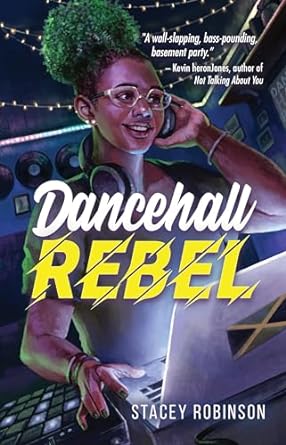Dancehall Rebel

Dancehall Rebel
... “When I was in Jamaica, I realized just how different the vibe is. Like, two girls our age were raped and murdered just because they were dating. That's terrible. I know we all have different beliefs, but murder? On a 17 year old? A female? Not good.”
I was glad that my new, small, online music community was interested in talking about social events as we listened to music together. I felt safe sharing my thoughts with them and happy for that space to chat.
I live stream a few nights during the week to practice my mixing skills. I perched my laptop on my dad's studio stand, set up my camera and monitor in the basement, lit up my special ring light, and started to play for all those who would listen.
Denise, in her final year in high school, is preparing to move from Brampton, Ontario, to Ottawa for university. She is of Jamaican descent. Her parents are both Jamaican immigrants and well connected in the Jamaican diaspora in the GTA (Greater Toronto Area). Her father is famous for his DJing of reggae music, and Denise is following in his footsteps with her own music channel where dancehall music and social trends were discussed.
The conflict in this story centres around Denise’s search for her identity. A mid-winter family trip to Jamaica, where Denise encounters a young woman whom she finds physically attractive, has her questioning her sexual orientation. Her attraction is in direct opposition with the Christian values held by her family, most of the islanders and the diaspora. The untimely death of Fitz, Denise’s father, just as she is preparing to leave for university heightens the tension and deepens her confusion. In Ottawa, Denise connects with an LGBTQ+ community where her DJing skills are celebrated. This acceptance helps Denise start to grow more confident in the expression of her feelings.
The writing is uneven. There is some great dialogue revealing Denise’s dilemma while other times the plot is merely recounted. Both approaches are illustrated in the excerpt. Patois is used throughout the story to connect the reader to Denise’s heritage. To fully understand the plot being unraveled in Patois, I had to go to Google on more than one occasion. Having to do so may frustrate young readers. Sometimes readers are given titles of songs which aid them in connecting with Denise’s emotions while other times readers are just told of the type of music being shared.
Robinson has taken on a big challenge by exploring this conflict and all the emotional nuances her characters are facing. In her efforts to communicate this conflict, some of the writing becomes didactic. The first-person narration gives readers a view into Denise’s point of view only. Perhaps the conflict would be heightened, more dynamic, if the reader could hear the conflicting side of the argument in another voice. A “book on tape” option where readers could hear the music would take this story to another level emotionally. Taking the time to stop and listen to some of the music selections, reading Bible verses, as well as the interruptions of deciphering the Patois, make Dancehall Rebel a challenging read for the intended audience.
Ruth McMahon is a professional librarian working in a high school in Lethbridge, Alberta.
